Jenna Coleman, Complex Characters and No Easy Answers: How ‘The Jetty’ Explores “Primal” Issues
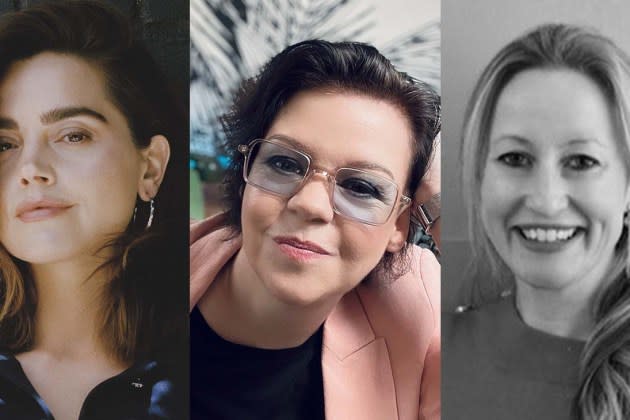
Jenna Coleman had “avoided” playing a detective – until she was approached about playing rookie cop Ember Manning in a scenic lake town in Lancashire in North West England in BBC Studios’ The Jetty from creator and writer Cat Jones and Firebird Pictures.
“What appealed to me was that the character of Ember was completely there on page one,” she tells The Hollywood Reporter. “Also, it’s a crime thriller, but it’s wrapped up in such a human, emotive, and poetic piece. It is crafted so it has all of the great things of a crime thriller – turning the page and having all of the beats. But it’s also such a feminine piece that really explores relationships and provokes. It has all sorts of blurred boundaries and is asking a lot of uncomfortable questions without fully answering them.”
More from The Hollywood Reporter
The four-part series, a Firebird Pictures production for the BBC, is set to debut in the U.K. later this year. BBC Studios, which owns Firebird, is the international distributor of The Jetty and is launching it at this week’s annual BBC Studios Showcase in London, which starts on Monday and brings program buyers from around the world to the British capital.
BBC Studios is betting that The Jetty can be a global hit, not only because it stars Coleman, best known for playing the timelord’s trusted sidekick Clara Oswald in Doctor Who, and because detective thrillers are popular, but also because the show promises to offer a potent mix of entertainment and explorations of such tricky topics as sexual morality.
BBC Studios has only teased plot details, sharing that Coleman’s Ember must investigate “the link between a fire at a peaceful lakeside holiday home, a podcast journalist investigating a missing persons cold case and an illicit love triangle between a man in his twenties and two underage girls.” Early this year, it revealed a first-look image and said that the protagonist will be forced to “re-evaluate her past, present and the town she has always called home.” It concluded: “As much a coming-of-age story as a detective thriller, The Jetty asks big questions about sexual morality, identity and memory, in the places that #MeToo has left behind.”
The series also stars Archie Renaux (Shadow and Bone, The Greatest Beer Run) as Ember’s sidekick Hitch, Laura Marcus (Bad Education, The Great Escaper), Bo Bragason (The Radleys, Three Girls), Amelia Bullmore (Gentleman Jack, Vienna Blood, Happy Valley) as Ember’s mother, Matthew McNulty (Deadwater Fell, The Rising), Weruche Opia (I May Destroy You), Tom Glynn-Carney (House of the Dragon, Dunkirk), Ralph Ineson (Nosferatu, The Witch), Ruby Stokes (Lockwood & Co., The Burning Girls) and David Ajala (Star Trek: Discovery), among others. The Jetty is executive produced by Coleman, Elizabeth Kilgarriff of Firebird, of which BBC Studios acquired full ownership in 2022, Sarah Wyatt, Jones, Marialy Rivas and Jo McClellan.
Coleman, Jones and Kilgarriff, in a conversation with THR, said they leaped at the chance to develop a show with a strong, but complex female lead character who must deal with tricky themes and issues and does so in a way that is close to life.
Coleman worked with Kilgarriff before on Amazon thriller series Wilderness. And Kilgarriff tells THR she “wanted to work with Cat for quite a long time, and I’d been sort of stalking her from afar” until Jones sent a one-page pitch for The Jetty to Firebird, and they finally had a project to work on together.
“What was really appealing was that it’s a detective show,” Kilgarriff recalls. “The audience loves crime thrillers, but it’s about using that as your way into a world and finding what it is you really want to talk about, whilst entertaining the audience. The other thing that we’re always looking for is that iconic character at the center. That was so clear from day one in terms of Ember. So we just worked together to sort of build the show.”
The dark questions and issues addressed in The Jetty were just what Jones enjoys tackling as a writer. “I’m so interested in [these topics] and detective dramas are so interesting because people want to examine human behavior in its most extreme form,” Jones says. “I used to work in the prison service. I was looking at people who had done these really extreme things and going, ‘I’m not capable of that but I’m capable of a version of that.’ Exploring the difference between what I’m capable of and what you are is really, really interesting.”
Her lesson from the experience: “You come to the conclusion that there are no bad or good people – just bad and good choices.” The Jetty gave her a chance to pick up this theme. “Detective films are all about exploring that and exploring one aspect of who we are right now. It just so happened that I wanted to explore men and women and how they relate to each other, and how attitudes change or don’t change,” she explains.
How difficult is it to write about such issues as sexual consent and grooming? “It’s quite difficult because they’re complex issues,” Jones tells THR. “And there aren’t easy answers to questions of how you keep women and girls safe. When you’re dealing with sexual relationships, you’re dealing with essentially primal stuff. How do you keep people safe within something that’s kind of primal? That’s really, really complicated, and I think we want there to be really easy answers to all of that stuff. So it’s hard, and it’s confronting, but I think that’s a good thing. People will have very different opinions about the things they see, and I think that’s a good thing because that promotes dialog about those things.”
Coleman also felt this tension while acting as her character Ember. “The way Cat wrote it is probing, it’s uncomfortable because it confronts you and asks the questions without an easy answer,” she tells THR, lauding the writer for combining fun and entertaining elements with challenging issues in the series. “What I enjoyed so much about Ember is that her good character traits are also her flaws – her pride and her beating down the door and not being able to give up, and her arrogance in certain ways. All of those traits that are her best bits are also her flaws. So we see her turning in on herself all the time. We really see her in so many extreme, complex, emotional segues.”
Kilgarriff agrees. “Jenna said it: her positives are also her faults in lots of ways. But you would want Ember to turn up to the crime scene if something had happened to you. And I think that’s so important to the audience. So, there are lots and lots of layers going on. There’s lots of complexity.”
That also includes, just like in real life, humor amid the drama. “Ember goes on a big journey across the four episodes. We don’t let her off the hook at all. But she is always quite badass. And she’s really funny,” Kilgarriff says. “She is that person who might say the wrong thing, but you just love her, because she’s just so cool.”
Coleman highlights that in early creative discussions, the team also agreed on the importance of the place, the location as a character in the show, which was mostly shot around the Rochdale area in Lancashire.
So, the lake featured in the series serves as a metaphor for the depths and complexities of her character and others around her and the realities they are confronted with. “That image of the lake and water and echoes and memories and the secrets that lie beneath, all of that is so important,” Coleman explains. In that sense, the image of the lake reflects “Ember’s relationship with the past, her relationship with her mother, with her daughter, with the girls in front of her.”
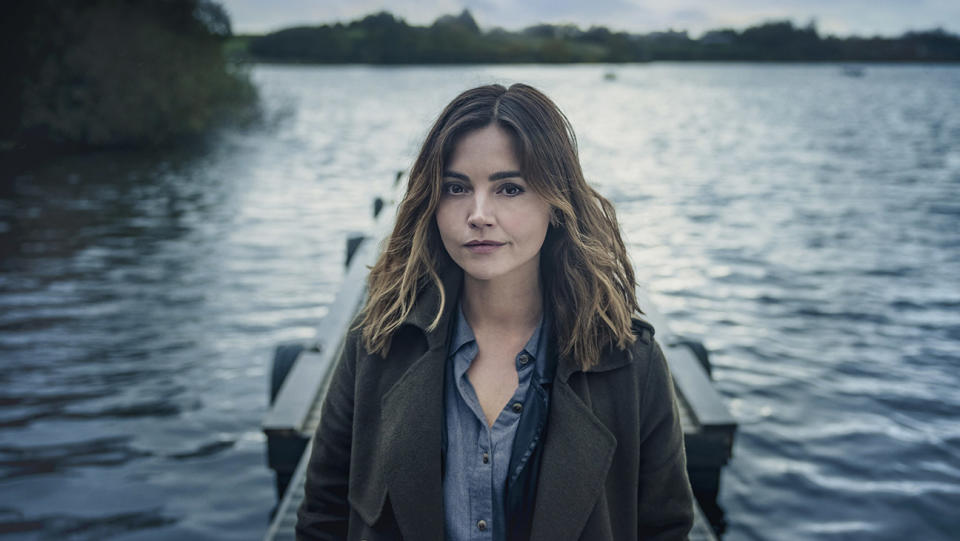
Could audiences see more of Ember in the future? Coleman, Jones and Kilgarriff also addressed that and other issues in a conversation with THR‘s global business editor Georg Szalai. Read more of what they shared about The Jetty below.
Liz, how early did you know that you wanted Jenna for the role of Ember?
Kilgarriff I know everyone always says this, but it is genuinely true. We talked about Jenna playing Ember even before I think we had the green light. She’s young but she’s lived a lot in her 34 years. So it’s about finding that person who would bring the gravitas but also the humor because I think the humor was so important. That shines through in the show and in Cat’s writing, and then obviously in the show. So we needed someone who would bring us that. We were very fortunate that Jenna agreed to play Ember.
The show sounds like a deep dive into human psychology…
Jones I’m definitely interested in looking at peripheral behavior and the gray area. That’s something I’m keen to do whatever I’m writing. It’s what good detective dramas do: they take you on a journey that is as much about making you as an audience member feel complicit and go, “Who am I and what am I capable of?” We’re not trying to answer questions because we don’t know the answers, because they are really complex questions worth exploring in drama. I would love to think that people might be sitting at home arguing on the sofa. That would make me really happy. Rather than there being any kind of moral absolutes because life is more complicated than that.
Jenna, did you ever find yourself in a scene thinking, “I don’t even know how I would react to this in real life,” and struggling with how to bring your character’s struggle to life?
Coleman Yeah, for sure. There were a lot of scenes like that actually. But I knew who Ember was from the moment I turned the page. So if you know who she is, then no matter what situation you’re put in, you’re going to react. When you know the character, you can kind of go anywhere. And again, there’s no right or wrong with that. There were so many brilliant scenes thanks to Cat where there were so many ways to go.
Kilgarriff I feel Ember can sort of do no wrong. She’s also got a good partner. We’ve got Archie Renaux playing her sidekick, Hitch. It’s a very interesting relationship. It starts out very much like, “oh God, he needs to learn from Ember,” and Ember is a sort of older sister, teaching him the way. But as we go along, there are moments where he just will say things that make her sort of stop and perhaps second-guess herself a little bit.
Coleman That is a dynamic that gives us so much of the humor in the show.
I picked up from descriptions of the series that you were striving for a nuanced portrayal and presenting a really true-to-life way of how people talk and behave…
Jones Yeah, Ember is kind of ordinary and extraordinary at the same time. She’s the person you’d want to turn up. She’s pretty awesome. She’s going to solve the crime. And, more importantly, she gets why it matters, with an emotional level to solve it. But she’s really flawed, and I love that. I love that her flaws are on display and she breaks the rules, but she’s got this really strong moral code and a really strong sense of justice. She protects vulnerable people. And for me, people like that are heroic, regardless of their flaws. I can’t wait for people to see Ember. I think she was a pretty cool character on the page. But what Jenna has done with her is amazing.
You know that thing where you’ve got two friends, and you know when you introduce them, they’re going to love each other. That’s how I feel about audiences meeting Ember. She’s just exactly the person you’d want if you’re in trouble. She’ll sort it out. And she’ll make jokes about it as well. She’s fun to be with.
Kilgarriff That is just Cat’s writing. On the surface, things look very clear. But then beneath that, there are about 100 other things going on, often subconscious or beneath the surface. So they’re quite complex.
Coleman That was so brilliant. There were so many themes, there were so many things at play within Ember, so some things could just hit me and surprise me as the actor. And I think that’s because the writing is so gray and so dense, and there’s so much in it. So, sometimes a scene can take on a completely different life because there’s so much subtext beneath the surface. In the day-to-day, being constantly surprised about what was coming up was like one of the really great things about it.
A big thing for me in terms of dialog is avoiding cliches. I was really conscious. I was like, “No, I don’t want to put my hands in my pockets.” How do you do that? In Cat’s writing, it’s such a human story. It was just so fleshed out, it was all emotional- and human-led.
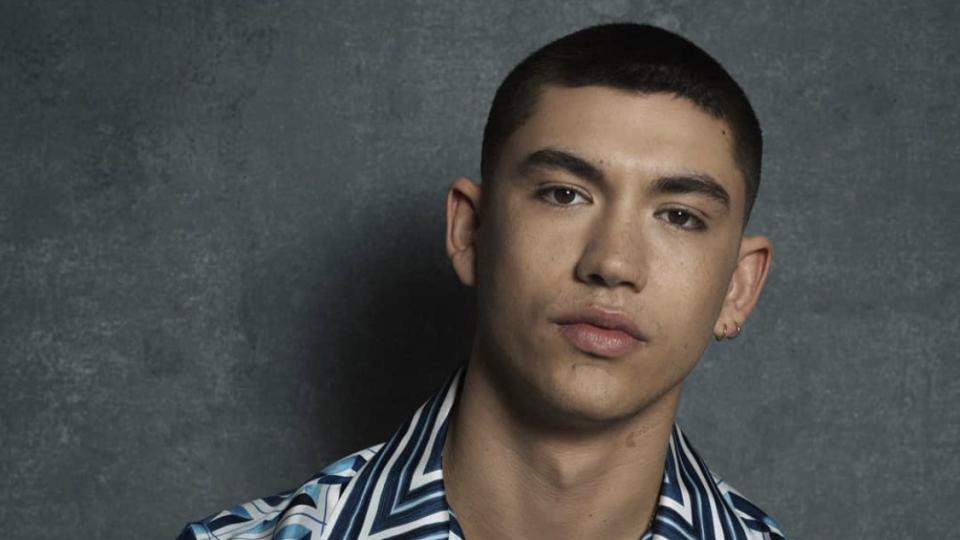
I heard BBC Studios wants to tell more bold stories of women, and maybe do so in new or different ways. Why do you think audiences have more appetite for such fare? Does that have to do with societal change?
Kilgarriff This is something we’ve all talked about a lot, all three of us. I feel female characters even now still can sometimes sit in boxes on television. “They’re the sort of that one or that one or that one – the strong woman or the tough woman.” But gender doesn’t really matter if what a character is going through is honest. It does matter, obviously, in terms of lots of parts of our show. But there’s something about the connection with Ember that is just very human. She’s just very human. She just makes mistakes, as we all do. So there’s something that’s very relatable to her and actually all the characters in the show.
That’s the beauty of it because perhaps all of us see something of ourselves in many of the characters. It doesn’t let the audience off the hook. I think you’re sometimes surprised by how you’re feeling about a certain person. And then you have to question that and go, “oh gosh, what am I supposed to be feeling here?”
And that’s the joy of it, because there’s no judgment. There’s just presenting human beings and understanding how people go down certain paths.
Jones Historically, I think, people were less likely to accept or want a complex female character. And I remember you’d hear things like, “will people like her?” Or this idea that certain characteristics were unlikable in female characters, but they would be okay in male characters. And females would either be utterly flawed and irredeemable or kind of angelic, and nothing in between.
But I think we’re getting more accepting. I think that’s general to all characters. Once upon a time, in storytelling it used to be the case that if your character was selfish, they were always selfish. But characters are selfish and selfless, and flawed and brilliant, and heroic. You can be all of these things at the same time.
I suppose that there was a feeling that audiences might not be able to orientate themselves. But actually they can because audiences understand that people are complex because they are complex. So, I think we’re getting better with complex characters generally, but female ones in particular.
Liz, Firebird says it is putting storytellers first. How does this play out in your day-to-day work?
Kilgarriff That does sit at the heart of everything we do. I don’t actually know how it can be any other way. All our shows have very strong creators at the center, and that starts with the writer. The way we work is very much that a writer-creator sits with a very small team. It’s the same with all our shows. It’ll be me and one or two other people and our writer-creator. We build from there. Then we go out and sell to a broadcaster. It’s a very competitive industry. You need to love your show and be very invested in the creator at the center so that you start with the strongest possible foundation.
For me, it’s about the storyteller being part of the process. So I suppose we start from the inside out. There’s our writer-creator as a storyteller at the center. And then everybody involved is bringing different things to how we bring that to the screen. Obviously, Jenna is her own storyteller in lots of ways, in terms of breathing life into the character. So is the rest of our cast. So that story just gets bigger and bigger and bigger. But it’s very important for us that writers-creators, storytellers sit at the heart of things. That’s the only way you get the complexity, the depth, and the authenticity.
Jones Throughout the process, it is about always coming back to the story you want to tell. If you’ve started out from a strong position and want to tell the same story, then it’s great, because you just come back and remind yourself what you wanted to do.
A production is a big beast, and there are lots of people involved. Our job is to just keep reminding people of the story we’re telling. And Jenna’s job is to keep reminding us of the character at the heart of the story we’re telling because that’s a slightly different thing.
It’s quite an interesting thing because as a writer, you’re often watching quite a lot of things. And sometimes you’re exploring particular ideas and you want to hang those ideas on characters. And then if you’ve got a great actor, the actor becomes the expert in that character. And they come back to you sometimes and say, “No, this is not what this character would do or say here.” And you have to listen to that.
I’m hanging this idea on this character, but Jenna is seeing it from the inside and responding to it in a visceral way. She’s in the character in a way that I’m not. So we’re all champions or guardians of our bit. I’m guarding the story and the ideas and the characters, but Jenna is super focused on Ember.
Of course, you want to absorb other ideas as there are lots of brilliant people involved, but you just have to keep coming back to the story of the character.
Kilgarriff The really important thing I always think about is the heart of the show, the beating heart. We all knew what we were making, that lovely thing where you just go and there’s that trust as everyone is making the same show. The key thing is the trust that everyone is striving in the same direction.
Coleman I felt with this piece in particular there was such an intimacy in terms of our creative conversations and collaborations. The nature of shoots is their unpredictability. I think we had five storms. All of these things happen, and then suddenly, you’re dealing with the day-to-day of production and things shifting and changing. But we used to get these amazing emails from Cat every day, just talking about the themes and the characters and thinking about things like that that always brought us back to the story and to the heart of it. It did very much feel like we all had the same creative vision for it.
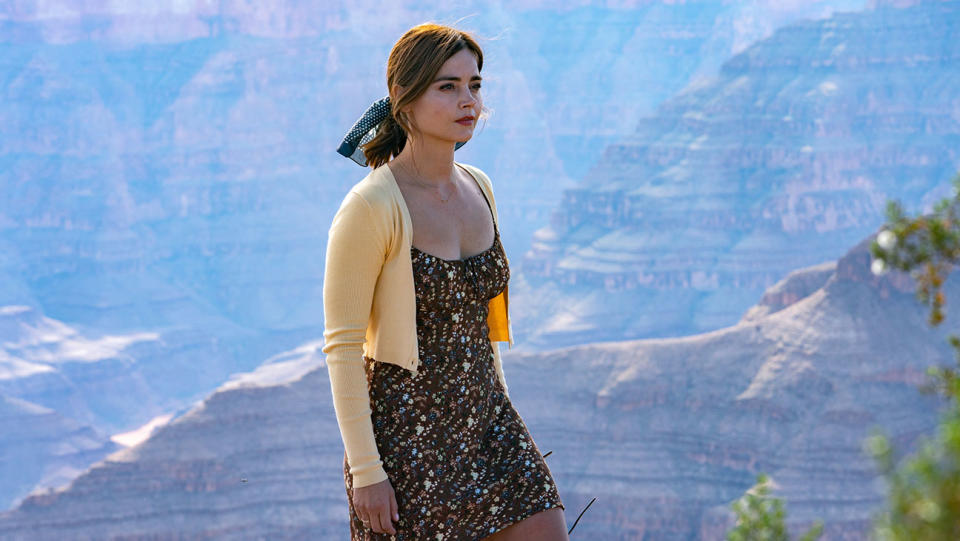
Could we see more of Ember in the future?
Kilgarriff The show works very well, it is very satisfying as a piece, which I think is really important for the audience. Saying that, but I don’t want to give anything away, I would love to see her back again. And I do think the audience is going to respond to her in an incredibly positive way. So, yeah, it would be wonderful. But we don’t know that.
What are people going to call this genre? Northern English Noir? Did you think about genre categorizations?
Jones It’s a detective thriller, but it’s just as much a character piece and, I hope, an exploration of grief and memory and how we reinvent ourselves. I hope it’s doing lots of different things. People who want a show that is twisty and turny will love it. But so will people who want to see something complex and probing and go through a complete range of emotions and think about interesting ideas. In that regard, it’s a pretty good character piece.
Kilgarriff It’s definitely got the noir aspect to it thanks to the weather. It actually looks so beautiful. I have to say it is really beautiful. We talked a lot about the look and the feel, wanting it to be beautiful but not chocolate box, it shouldn’t feel fake, this sort of fake British perfect little town. It shouldn’t in any way feel unreal. There is a beauty to it, but there’s a rawness to it as well, and there is a sort of dark fairy tale feel to it. There’s always something simmering beneath the surface, which I think will be hopefully really, really compelling. It probably has that sort of Scandi noir thing. The location has its own microclimate.
Coleman The rain and the sun came out in the same scene.
Kilgarriff It was tricky, but it feels like it is absolutely a part of the identity of the show.
What kind of support did you have on set given the difficult and tricky issues addressed in the show?
Kilgarriff A lot of that is about the prep, isn’t it, Jenna? They’re not coming into the scenes on the day unprepared. There is a lot of conversation that happens beforehand, with Cat, with our director. It was really important for us to have all these conversations upfront and talk everything through, so everyone understands where they are and what they’re doing. And then obviously, you always have an intimacy coordinator as well on the day for any scenes that need that. Generally, it’s just about an openness and a conversation.
Coleman Yeah, and I’d say, whether it was conversations with Cat in the morning, conversations before or on the day, it was a very intimate, collaborative, supportive atmosphere.
Anything else you’d like to highlight?
Jones Because there are some quite heavy themes in the show, sometimes I come away from conversations thinking, “I probably should have stressed the fact that I think this is a really entertaining show.” Television has to be entertaining and important for it to work for me. I want to be watching complex characters going on a journey and going through a complete range of motions and think about things. I want do all of that, but it’s going to take me on a ride, you know? And I think this does. I think it’s a thoroughly entertaining watch, as well as everything else.
Coleman What Cat means is it’s also funny.
Jones It’s really funny. I hope so. You’re very funny, Jenna. And she’s a very entertaining character. There are lots of scenes of Ember and Hitch in cars, driving around places. I would love to do a spin-off show of just Ember and Hitch driving around, just talking about things. They’re so entertaining. There’s not enough space to have as many of those scenes as you want.
Coleman I kind of wish we were recording right now.
Kilgarriff It’s really fun watching it in the edit, I have to say. Ember and her mother, I think, Amelia and Jenna, they are fantastic. I can see a spin-off in those two as well. I think lots of people will identify with that relationship. It’s very moving and very funny. So it just feels very real.
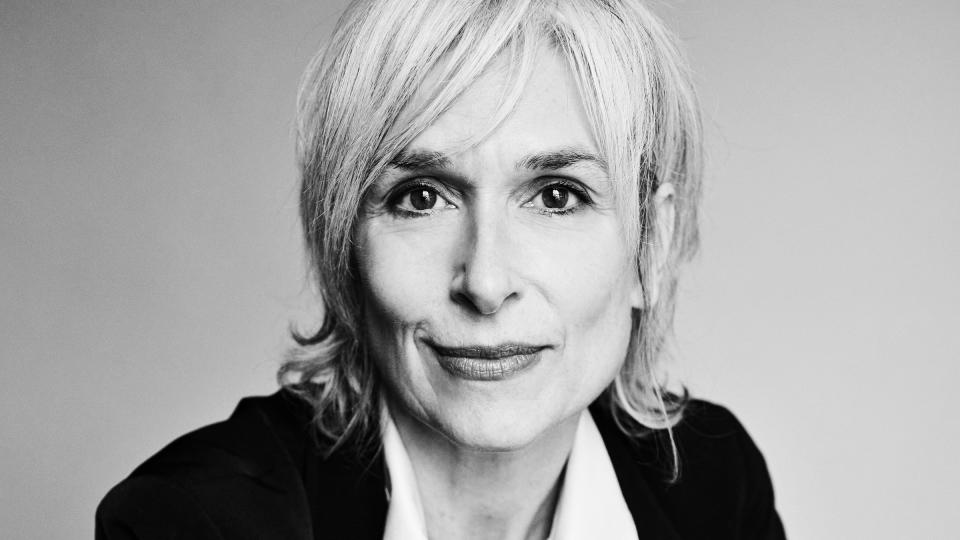
Best of The Hollywood Reporter
Solve the daily Crossword

